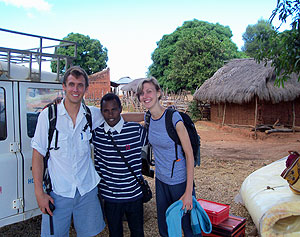
In summer 2011 I spent 6 weeks on my medical elective in Madagascar, and found it to be even better than I had imagined. I think that I went out expecting a real time of testing, but in fact it was a pleasure!
I undertook a placement in the remote central Madagascan town of Mandritsara, at a small but renowned mission hospital. Hopitaly Vaovao Mahafaly ('Good News Hospital') was founded nearly twenty years ago by a British surgeon, who still works tirelessly today. I mostly spent my time in the 22 bed ward helping out with ward rounds, clinical procedures and emergency admissions. There was also an opportunity to see outpatients (with a translator), be on call, go on trips with the community health team and scrub in in theatres. There, I was struck by the skill and resourcefulness of the surgical team when faced with an extensive range of cases. Operations included everything from the removal of a football sized ovarian teratoma to repairing the mutilated leg of one man after a run in with a crocodile. A memorable morning was spent holding the hand of a young woman undergoing a cleft lip repair, and watching the tears of joy flow when she looked in the mirror afterwards. The very next operation might have been an emergency caesarean section or limb amputation!
Outside of the working hours of 7.30- 5 (with a long lunch break) my time was spent in the grounds of the hospital where the missionaries live. The nurses and clerical staff lived in town but there were 3 families and a few other European missionaries including a GP, midwife, church pastor and the founding surgeon and his wife. The guest house is home to a varying number of people, and during my time there was one other Canadian elective student who left and was replaced by a London plumber! I also got to know short term visitors who flew in with MAF or just came for a few days.
The best bits
Friends and fellowship: I've never lived in Christian community like it, and missionaries and locals alike were just so welcoming. I could hardly go one day without an invitation for tea/cake/a game/dinner or even chameleon shaped pancakes!
Learning opportunities: With limited investigations available, I learnt to rely more on clinical diagnosis and problem solving. I'll also never overlook splenomegaly now that I've examined a 'tropical spleen'!
Getting involved: Like everything, if you get stuck in and show willingness you will be a valued member of the team and will get lots out of it.
Variety: There really were no two days the same at HVM, particularly when students can get involved in a wide range of specialities and activities both within the hospital and the church .
Living: I was much more comfortable in Oasis guest house than I'd expected to be in the middle of remote Madagascar! It depends what you are used to, and how much you are willing to adapt. For example we used buckets or a trickling cold shower to wash and had to cook everything from scratch with limited ingredients, but life for the locals is much harder. The guest house has electricity and the best equipped kitchen that you've ever seen, including an ice cream maker and vegetable steamer! We even watched a DVD on someone's laptop one night, though a lot of time was spent just chatting and I read a lot too.
Cost: If you are on a budget, then Mandritsara is the place to go. I realised just how rich I really am when I paid the price of a latte for my weekly market trip.
The challenges...
Morbidity and mortality: At times I found myself frustrated by the lack of resources, and the high number of deaths from what would elsewhere be treatable or preventable conditions. However, the hopeful cases outnumbered the hopeless ones, and there were always people to talk to or pray with if ever it felt too much.
Language: This was also one of the best bits about my time at HVM. I loved the 'melange' of different languages, and the opportunity to put my farfrom- fluent French to use. Very few locals actually speak French, but it is the working language on the ward. Nurses may go with you to speak to patients and translate from French, and there is the odd person who can understand English. However, I didn't find that language was that much of a limitation and you just bumble along as best you can. A lot of the medicine doesn't actually rely on communication skills in the same way that it does in the UK.
Transport: This depends on your tolerance, levels of anxiety and ability to endure extreme conditions! Getting around by taxi brousse can be an adventure or a trauma, depending on your attitude. I had journeys where we had to stop regularly to check that the bumper had not fallen off, frequent break-downs, and one where I sat with the gear stick between my knees and had to hold the foot brake when the driver alighted as the handbrake had gone!































